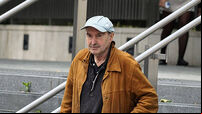George Nkencho death: Family unsuccessful in appeal over decision not to prosecute gardaí

Seán McCárthaigh
An appeal by the family of George Nkencho against the decision of the Director of Public Prosecutions that no garda should face prosecution over his fatal shooting by armed officers in Dublin over four years ago was unsuccessful, an inquest has heard.
A sitting of Dublin District Coroner’s Court heard that an internal review within the DPP’s office had upheld the original decision that no criminal proceedings should arise out of the death of Mr Nkencho.
The 27-year-old suffered fatal gunshot wounds during an incident involving of the Garda Armed Unit outside his family home at Manorfields Drive, Clonee, Co Dublin on December 30th, 2020.
The lead investigator with the Garda Síochána Ombudsman Commission (Gsoc) in the case, Stuart Duguid, told the coroner, Myra Cullinane, during a brief hearing on Friday that no further criminal proceedings were being contemplated following the review of the DPP’s decision and the inquest into Mr Nkencho’s death could proceed.

Dr Cullinane noted that Mr Nkencho’s relatives had been provided with a summary of the DPP’s reasons that there should be no prosecution in July 2024.
The family then formally requested a review of the decision the following month with the formal review process commencing last September.
The deceased’s mother, Blessing Nkencho who was accompanied by one of her sons, Victor, at Friday’s hearing declined to comment on the outcome of their appeal to the DPP.
“We don’t want to say anything at this point,” said Ms Nkencho.
Dr Cullinane also addressed an application made previously by counsel for Gsoc, Marc Thompson BL, for the body (which has recently been renamed Fiosrú – the Office of the Police Ombudsman) to have legal representation at the forthcoming full inquest about which she acknowledged she had reservations.
The coroner observed that many tragic deaths were investigated by Gsoc and it was perfectly acceptable that the organisation assisted her in holding inquests.
Dr Cullinane said Gsoc was very effective and she was very grateful for all its assistance.
However, the coroner had previously observed that it would be “potentially unnecessarily complex” if Gsoc was represented as an interested party at the inquest when it had been assisting her office in the investigation into Mr Nkencho’s death.
The inquest heard other parties had not had an opportunity to consider a late submission by Gsoc to the coroner about why it should be granted legal representation at Mr Nkencho’s inquest.
Counsel for An Garda Síochána, Frank Kennedy BL, and counsel for the deceased’s family, Seoirse Fennessy BL, both applied for an adjournment of the matter in order to take instructions.
Dr Cullinane directed that submissions from the two parties should be received by her office by May 9th and she adjourned the issue for mention to May 16th.
The coroner observed that Mr Nkencho’s family were frustrated at how long it was taking to hold the inquest, although they understood the reason for the delay.
Dr Cullinane remarked that there had already been a significant number of adjournments since the inquest was first opened in June 2021.
She also noted that Gsoc were engaging with local authorities about assembling a jury from the electoral list to hear the inquest.
Dr Cullinane pointed out that gardaí were normally responsible for assembling juries for inquests by coroners but noted there were some concerns about that where An Garda Síochána were involved in the circumstances of a death.
The coroner also advised the parties that it would be “a difficult inquest to convene” in fixing a date for the full hearing.
The fatal shooting of Mr Nkencho outside his home in west Dublin occurred after a stand-off developed between gardaí and the deceased who was armed with a kitchen knife.
The tense situation arose shortly after Mr Nkencho had been involved in an incident at a local Eurospar store where he assaulted a shop assistant.
The young man, whose family come originally from Nigeria, was pronounced dead a short time later at Connolly Hospital Blanchardstown.
Post-mortem results revealed he died as a result of multiple gunshot wounds to the torso.
His family claim he was suffering from mental health issues for several months before his death and that the level of force used against him by gardaí was disproportionate.









